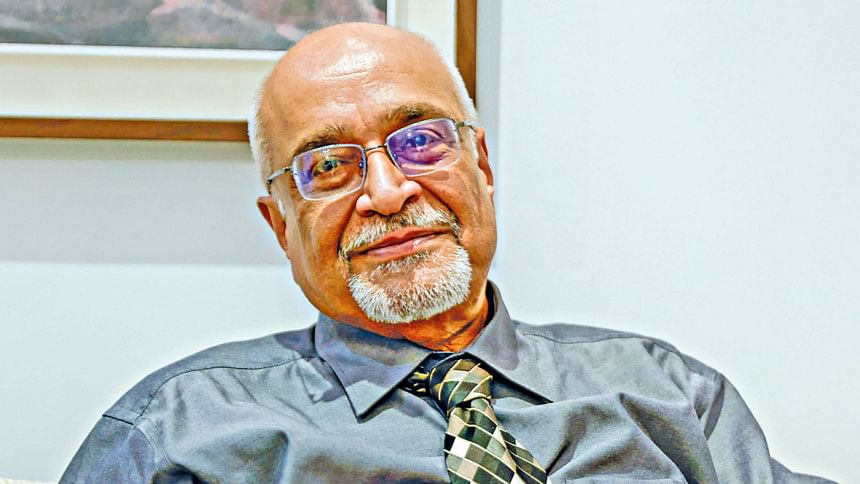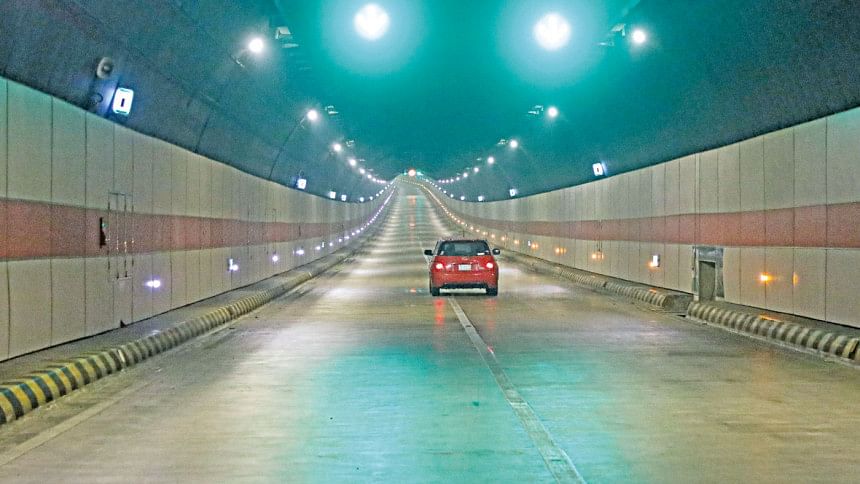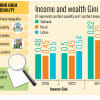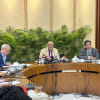The trials and tribulations of preparing the white paper

After three months of rigorous work, a white paper panel on the state of the economy revealed all the fault lines that had formed across Bangladesh during the 15 years of rule under the Awami League government, which held power from 2009 until it was ousted by a mass uprising on August 5 this year.
Upon taking office, the interim government issued a gazette notification on August 29, deciding to plumb the depth of corruption and mismanagement of state wealth during Sheikh Hasina's regime. The report, prepared by a 12-member panel of independent experts, was submitted to Chief Adviser Muhammad Yunus on December 1.
The white paper laid bare the fragile state of the economy, addressing issues such as the rise of an oligarchy, heightened inequality, data manipulation to present a false narrative of economic growth and rampant money laundering.

The committee met 618 times to plan and discuss the task at hand, held 60 consultations with stakeholders, conducted 22 policy-specific consultations, 17 technical consultations, key informant interviews, and three public hearings outside Dhaka to form a clear picture.
The leader of the panel, Debapriya Bhattacharya, a distinguished fellow of the Centre for Policy Dialogue (CPD), spoke to The Daily Star last week, shedding light on the process of preparing such a massive document.
He said the formation of the panel was an obvious decision as the country and the interim government needed a formal document to bring to light all the issues that had been swept under the rug for years.
"The whole system was politicised, and there was a narrative of a high-performing economy. But in reality, it was not that. This is why the concept of a white paper was considered," Bhattacharya said.
"The idea behind preparing the white paper was to provide insight into the nature of the economy that the interim government had inherited. It had to identify the challenges that the interim government would face as it tried to take the economy forward."
In order to understand the situation, a transparency exercise was necessary.
"For that transparency exercise, one needs to look at all existing data, including the data that is not publicly available, and also talk to specific stakeholder groups who are knowledgeable in these areas," he said.

Bhattacharya also elaborated on the origins of the white paper, saying: "The white paper comes more from British traditions, the British Parliament. When a situation arises which has no immediate or obvious solution, a group of experts is mobilised to analyse the problem and give an opinion. It may be one opinion, it may be more than one opinion, depending on the group, and how they think about or look at the problem."
The advantage of a white paper is that it is commissioned by the authority, which may be the parliament or the government, but the authors write it as independent experts.
"So, it is commissioned by the government, but it is not the government's report. Although the chief adviser commissioned us to write the white paper, it does not belong to him. It belongs to the authors. The authors are responsible for whatever is said, not the government," Bhattacharya said.
Another advantage he pointed out is that the government is not obliged to adopt the solutions given in the paper. "The government has the flexibility to implement whatever it wants, however it wants."
However, he highlighted a significant issue: many readers, including journalists, lack sufficient knowledge of economics, leading to confusion when interpreting the data.
For example, the white paper said Bangladesh had illicit outflows amounting to $16 billion per year.
But some people say it is such a big number, how can it be true? They say the government's annual budget is smaller than that.
According to Bhattacharya, the problem is that people who say such things lack understanding. Economists never deal with absolute numbers; they deal with relative numbers.
"The amount that we have pointed out is only 2.4 percent of the GDP, which may be a big number to some. But the global average is 3 percent to 4 percent. People have no idea about that. This is an interpretation problem."
He also painted a picture that everyone can understand, saying: "We could have had 22 Padma Bridges and 16 metro rails and doubled the current allocation for education. These have all been forgone (due to illicit outflows)."
Bhattacharya added that the white paper was a heuristic exercise in the sense that it depended on the critical analysis of existing data.
In that sense, the white paper looks at what has happened in the past. At the same time, it also looks at why these things happened. But it focuses less on what needs to be done.

"We looked at some of the unpublished documents which were available with the government. We also debriefed some of the critical interlocutors of policies to hear internal stories in order to interpret the issues at hand."
However, it was when looking into this data that a pattern of manipulation began to emerge.
"The data was the villain of the piece," Bhattacharya said.
"For example, you have high growth but very low private investment, high growth but no tax collection, and high growth but very little money going to social protection, health, and education. It was our job to unearth the malice."
The development narrative only reflects a deficit in democratic accountability, he added, saying that the past government tried to secure local and global legitimacy through such stories.
"We had three elections which were very bad. This eroded the accountability process."
Bhattacharya also explained how the lack of democratic pluralism – which meant that nearly all positions of formal political authority could be controlled by one group – had led to a culture of crony capitalism.
"Without democratic pluralism, you begin to create a group of preferred businessmen. Those businessmen, after some time, turn into politicians and bureaucrats. These people develop a culture of crony capitalism. Initially, they create a group that will serve the regime. But after some time, they become so powerful that they themselves start running the country. Then they create a kleptocracy, where thieves are the rulers."
These "thieves" did not stay confined to just one sector; they were active in the energy, Information and Communications Technology (ICT), and banking sectors as well as offshore drilling, private universities, and television channels.
"They were like octopuses. They influenced not only the judiciary but also legislation. This system enabled the banking law to be passed in parliament in a split second. It was like an oligarchy."
They also took control of the judiciary, so it was hamstrung, he added. Furthermore, civil society did not have any space to raise their voice.
"Such an antagonistic contradiction cannot be resolved without revolution."
If politics is unsustainable, society will also be unsustainable, he said, adding: "Ten percent of the population is controlling 85 percent of the assets. How is that possible in a modern society? This unequal growth cannot continue."
The white paper committee used data from a Global Financial Integrity (GFI) report and Bangladesh Bank data, according to Bhattacharya.
"We also looked at the inflation figures as they had been underestimated in different cases. We also looked at energy pricing and a wide range of other issues, including health, education, and poverty. We also looked into the debt burden, both local and foreign."
He also took the time to again point out the purpose of the paper.
"A white paper is not an investigative report. There is a difference between investigative reporting and penning a white paper. It is a research document based on a multidisciplinary multi-methodical approach. These are estimates, not empirical evidence. But you cannot call it a guesstimate. We followed particular methodologies."
He also made some suggestions to the interim government, urging it to create a midterm plan to ensure accountability.
"The interim government is not here for five years, but the economy and investment cannot run based on day-to-day projections. The projections should be for a two-year term."
Bhattacharya also said the country's graduation from the status of a least developed country (LDC) to a developing country must not be delayed.
"Reducing export incentives was a good decision. It shows that we started preparing for graduation."
He further asked the interim government to negotiate with other countries as graduation would result in the erosion of preferential trade benefits.
Additionally, the interim government should hold dialogues with various groups, including traditional development partners like the World Bank and the Asian Development Bank, special markets such as the EU, Canada, India, and China, and foreign investors, he said.
"Debt management is unsustainable; every year it is around one billion. We need to renegotiate loans," he added.
Bhattacharya noted that they had received extremely positive responses to the white paper from local and foreign quarters, adding that even the global media had taken note.
"Around $2.5 million in consultancy fees would have been required to make this white paper. But not a single taka was taken from the government. It was done free of cost," he said.
Why leave such a large sum on the table?
"Because this is a unique time to work for the country."

 For all latest news, follow The Daily Star's Google News channel.
For all latest news, follow The Daily Star's Google News channel. 





Comments